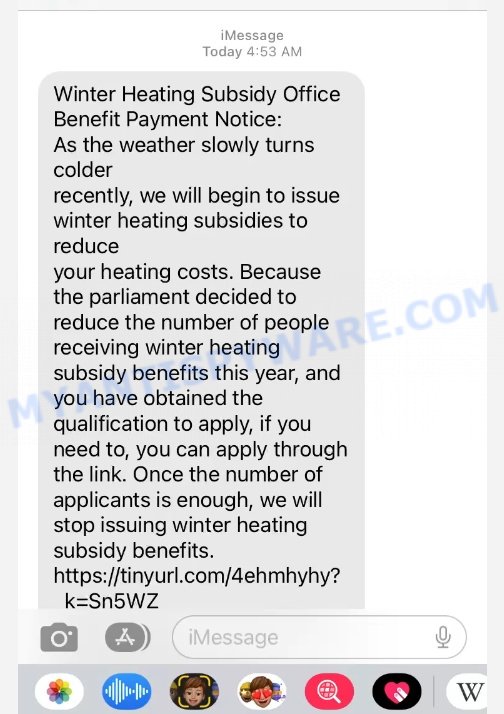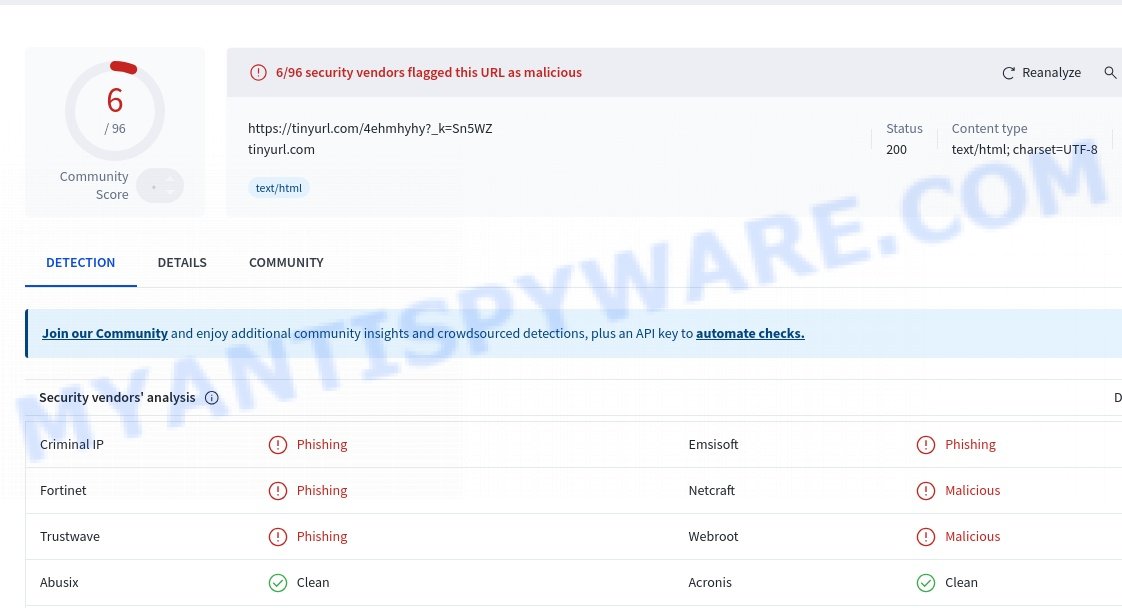Have you received a text message offering a Winter Heating Subsidy, urging you to apply through a provided link to reduce your heating costs, and claiming government support?

Question: Is this message a real notice from the UK Government about a winter heating subsidy, and should you click the link to apply?
Investigation Findings: The links in these text messages have been flagged by VirusTotal as phishing and malicious. These messages are part of a scheme designed to trick individuals into providing personal information or downloading harmful content.
Answer: These “Winter Heating Subsidy” text messages are scams. They are not sent by the UK Government. 💡 To protect yourself from scams like this, never click on links in unsolicited messages or provide personal information without verifying the source. Additionally, consider blocking the sender and reporting the message as a scam.
Winter Heating Subsidy Text Scam overview
The Winter Heating Subsidy scam messages with subjects like “Winter Heating Subsidy Office Benefit Payment Notice” or “Winter Heating Subsidy Reminder” state that recipients can apply for or need to update information to receive a heating subsidy. These messages falsely claim a link to UK Government support programs, but in reality, they are not associated with any government or legitimate organizations.
A typical “Winter Heating Subsidy” scam text message may look like this:
Winter Heating Subsidy Office Benefit Payment Notice: As the weather slowly turns colder recently, we will begin to issue winter heating subsidies to reduce your heating costs. Because the parliament decided to reduce the number of people receiving winter heating subsidy benefits this year, and you have obtained the qualification to apply, if you need to, you can apply through the link. Once the number of applicants is enough, we will stop issuing winter heating subsidy benefits.
hxxps://tinyurl.com/3wncban2?_k=gDU_d
Thank you for you support of the UK Government.
or
Winter Heating Subsidy Reminder: Winter is coming, and we will continue to issue winter heating subsidies to help you survive this cold winter smoothly.
Since you are eligible to apply, please update your information in the link after reading the information.
hxxps://tinyurl.com/mhbeff9s?_k=tl2Gp
Thank you for you support of the Uk Government.
These messages include links that, if clicked, direct users to phishing websites. These sites can ask for sensitive information like personal or banking details. Cyber criminals can misuse this information for identity theft or financial fraud. Therefore, if you have shared any personal or financial information with these scammers, contact the relevant authorities immediately.
VirusTotal flagged a “Winter Heating Subsidy” link as malicious and phishing:

Summary Table
| Name | Winter Heating Subsidy Text Scam |
| Type | Phishing Scheme |
| Goal | Steal personal information, money |
| Method | Fake text messages with malicious links |
| Target | General public, possibly UK residents |
| Domain Links | hxxps://tinyurl.com/3wncban2?_k=gDU_d, hxxps://tinyurl.com/mhbeff9s?k=tl2Gp |
| Risk | Identity theft, malware infection |
📱 What to Do When You Receive the “Winter Heating Subsidy” Scam Text Message
We advise everyone who receives this message to follow these simple steps to protect themselves from potential scams:
- ❌ Do not believe this message.
- 🔒 NEVER share your personal information or passwords via text.
- 🚫 Do not click on any links in suspicious messages.
- 🔍 Verify any phone numbers or links by checking the official website or contacting customer support directly.
- 📣 Report the scam text to your carrier by forwarding it to 7726 (SPAM).
If you accidentally clicked on a link in the “Winter Heating Subsidy” text, suspect that your device may be compromised, or just want to check for threats, use one of the free malware removal tools. Additionally, consider taking the following steps:
- 🔑 Change your passwords: Update passwords for your email, banking, and other important accounts.
- 🛡️ Enable two-factor authentication (2FA): Add an extra layer of security to your accounts.
- 📞 Contact your financial institutions: Inform them of any suspicious activity.
- 🔄 Monitor your accounts: Keep an eye on your bank statements and credit reports for any unusual activity.
🔍 How to Spot a Scam Text Message
Scam messages often share common characteristics. By learning these signs, you can detect and avoid text scams:

💡 Here Are Some Ways to Recognize a Scam Text
- 📞 Unknown or Suspicious Numbers: Scam texts often come from unknown or very generic numbers, not official customer service numbers.
- 🔠 Misspelled Brand Names: Look carefully for any misspellings in the brand or company names, as scammers often try to mimic real companies.
- 👋 Generic Greetings: Messages starting with vague greetings like “Dear Customer” may not be from trusted companies.
- 🔗 Suspicious Links: Do not click on any links in suspicious messages. Instead, visit the company’s official website directly.
- ⏰ Sense of Urgency: Messages that demand immediate action or else a penalty will apply are often scams.
- 📝 Spelling and Grammar Errors: Scam texts may contain spelling mistakes or grammatical errors. Legitimate companies usually ensure proper language use.
- 🔒 Requests for Sensitive Information: Trustworthy organizations do not ask for passwords, credit card numbers, or Social Security numbers through text.
✅ Conclusion
We hope this article has helped you understand more about the “Winter Heating Subsidy” Scam Text Message and how to protect yourself from scammers. If you receive a suspicious message similar to the example above, please share it in the comments section of this article to help warn others. Stay safe and vigilant! 🛡️
















